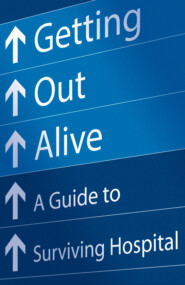скачать книгу бесплатно
Getting Out Alive: A Guide to Surviving Hospital
Michael Alexander
Best-selling author and professional nurse Michael Alexander offers practical and achievable advice on how you can get the best out of hospital visits and admission.In this short, fun and informative book, Michael Alexander, author of ‘Confessions of a Male Nurse’ explains how we, as patients, can have a hugely positive impact on our hospital treatment and care.Divided into three easy to read chapters, ‘Getting Out Alive’ looks at every stage of the health care cycle: before hospital, at hospital, and after discharge.Michael Alexander’s simple and easy guide to surviving hospital is essential reading for anyone in need of medical care, or likely to be in need of medical care in the future . . . Which is pretty much all of us.
Getting out Alive
A Guide to Surviving Hospital
Michael Alexander
Contents
Title Page (#udd52d33a-87a0-57c1-8a8c-f1f4aea536f3)
Introduction
PART I: Before You Go to Hospital
Expectations
Sheep
Risk factors
Know your body
Allergies versus side effects
Know your symptoms
Record keeping
The GP versus the ER
PART II: Navigating the Emergency Room
Triage
Things to do when in the Emergency Room
Things not to do when in the Emergency Room
Basic tests
An ECG (or Electrocardiogram)
Urine check
Getting ahead
PART III: The Inpatient
Error versus complications
Common errors and how to help reduce them
Medication Error
New medicines
Mistaken identity
Surgical error
Pain
Infection
Mobility means staying alive
Mobility exercises
Preventing falls
Who’s who
Discharge
Post hospital care
Conclusion
Also by (#u1652d83a-7720-57b5-b267-8944e28389df)
Copyright (#u3895d3aa-7192-57e3-9947-a743be01e22e)
About the Publisher
Introduction (#uadf4f1c7-9c05-5472-a2bf-b99ebca4c852)
Whether you hail from deepest Africa or the bright lights of New York, it is likely that at some stage of your life you will fall ill or be injured and find yourself admitted to a healthcare facility. It may be a tiny, overcrowded clinic in the slums, or it may be a highly prestigious hospital paid for by private medical insurance. Whatever the place, there are three definitive factors in deciding whether you make it out or not: your nurse, your doctor and you.
I have more than eighteen years of nursing experience behind me and I can confidently say I’d rather have a caring, knowledgeable, hardworking nurse practitioner in a busy clinic than be treated by an overconfident doctor working in an over-managed hospital full of unpractical and sometimes pointless protocols.
During my years as a nurse, I’ve worked in dozens of environments, and in most settings imaginable. From the Emergency Room to the neonatal ward, intensive care, and the psychiatric ward, I’ve seen the full spectrum of what really goes on in your local hospital. Fortunately it’s mainly good stuff: fantastic hardworking staff perform life-saving work, even in overcrowded and understaffed conditions.
Unfortunately, there’s no denying that sometimes things do go wrong. Often it is fate – it’s meant to be – but there are times when tragedies could have been prevented.
I want to share with you some ways in which you can improve your chances of coming out of hospital alive. In this guide you will find easy to understand, short-and-sweet advice on staying safe and being proactive during your care.
This book is designed to make your hospital experience as fast, smooth and comfortable as possible for both you and the medical staff treating you. Some of the things mentioned in this book might seem obvious or even overkill, but that’s because staying healthy and avoiding complications often is a matter of common sense. I hope you will be able to see this by the end, and take practical steps to help yourself.
By the end of this book, you will have an understanding of how health professionals approach illness and illness prevention, and of what we can and can’t achieve. This knowledge, I believe, can be just the motivation we need to make positive changes in our lives.
Вы ознакомились с фрагментом книги.
Для бесплатного чтения открыта только часть текста.
Приобретайте полный текст книги у нашего партнера:
